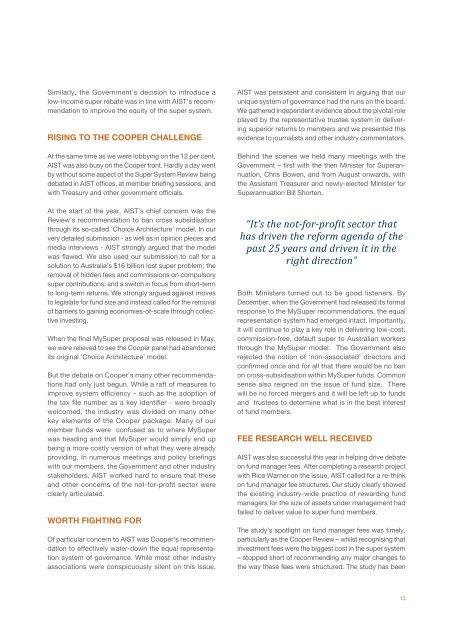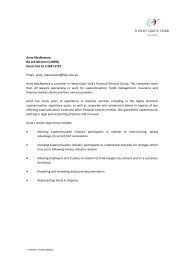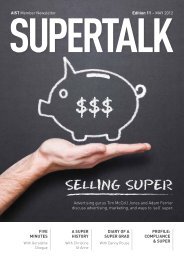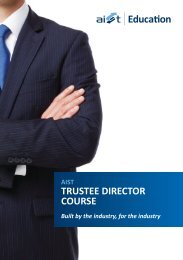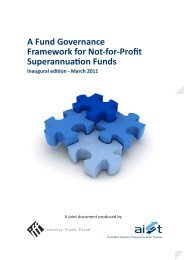Download 2010 Annual Report with Finance Report - Australian ...
Download 2010 Annual Report with Finance Report - Australian ...
Download 2010 Annual Report with Finance Report - Australian ...
You also want an ePaper? Increase the reach of your titles
YUMPU automatically turns print PDFs into web optimized ePapers that Google loves.
Similarly, the Government’s decision to introduce a<br />
low-income super rebate was in line <strong>with</strong> AIST’s recommendation<br />
to improve the equity of the super system.<br />
RISING TO THE COOPER CHALLENGE<br />
At the same time as we were lobbying on the 12 per cent,<br />
AIST was also busy on the Cooper front. Hardly a day went<br />
by <strong>with</strong>out some aspect of the Super System Review being<br />
debated in AIST offices, at member briefing sessions, and<br />
<strong>with</strong> Treasury and other government officials.<br />
At the start of the year, AIST’s chief concern was the<br />
Review’s recommendation to ban cross subsidisation<br />
through its so-called ‘Choice Architecture’ model. In our<br />
very detailed submission - as well as in opinion pieces and<br />
media interviews - AIST strongly argued that the model<br />
was flawed. We also used our submission to call for a<br />
solution to Australia’s $16 billion lost super problem; the<br />
removal of hidden fees and commissions on compulsory<br />
super contributions; and a switch in focus from short-term<br />
to long-term returns. We strongly argued against moves<br />
to legislate for fund size and instead called for the removal<br />
of barriers to gaining economies-of-scale through collective<br />
investing.<br />
When the final MySuper proposal was released in May,<br />
we were relieved to see the Cooper panel had abandoned<br />
its original ‘Choice Architecture’ model.<br />
But the debate on Cooper’s many other recommendations<br />
had only just begun. While a raft of measures to<br />
improve system efficiency - such as the adoption of<br />
the tax file number as a key identifier - were broadly<br />
welcomed, the industry was divided on many other<br />
key elements of the Cooper package. Many of our<br />
member funds were confused as to where MySuper<br />
was heading and that MySuper would simply end up<br />
being a more costly version of what they were already<br />
providing. In numerous meetings and policy briefings<br />
<strong>with</strong> our members, the Government and other industry<br />
stakeholders, AIST worked hard to ensure that these<br />
and other concerns of the not-for-profit sector were<br />
clearly articulated.<br />
WORTH FIGHTING FOR<br />
Of particular concern to AIST was Cooper’s recommendation<br />
to effectively water-down the equal representation<br />
system of governance. While most other industry<br />
associations were conspicuously silent on this issue,<br />
AIST was persistent and consistent in arguing that our<br />
unique system of governance had the runs on the board.<br />
We gathered independent evidence about the pivotal role<br />
played by the representative trustee system in delivering<br />
superior returns to members and we presented this<br />
evidence to journalists and other industry commentators.<br />
Behind the scenes we held many meetings <strong>with</strong> the<br />
Government – first <strong>with</strong> the then Minister for Superannuation,<br />
Chris Bowen, and from August onwards, <strong>with</strong><br />
the Assistant Treasurer and newly-elected Minister for<br />
Superannuation Bill Shorten.<br />
“It’s the not-for-profit sector that<br />
has driven the reform agenda of the<br />
past 25 years and driven it in the<br />
right direction”<br />
Both Ministers turned out to be good listeners. By<br />
December, when the Government had released its formal<br />
response to the MySuper recommendations, the equal<br />
representation system had emerged intact. Importantly,<br />
it will continue to play a key role in delivering low-cost,<br />
commission-free, default super to <strong>Australian</strong> workers<br />
through the MySuper model. The Government also<br />
rejected the notion of ‘non-associated’ directors and<br />
confirmed once and for all that there would be no ban<br />
on cross-subsidisation <strong>with</strong>in MySuper funds. Common<br />
sense also reigned on the issue of fund size. There<br />
will be no forced mergers and it will be left up to funds<br />
and trustees to determine what is in the best interest<br />
of fund members.<br />
FEE RESEARCH WELL RECEIVED<br />
AIST was also successful this year in helping drive debate<br />
on fund manager fees. After completing a research project<br />
<strong>with</strong> Rice Warner on the issue, AIST called for a re-think<br />
on fund manager fee structures. Our study clearly showed<br />
the existing industry-wide practice of rewarding fund<br />
managers for the size of assets under management had<br />
failed to deliver value to super fund members.<br />
The study’s spotlight on fund manager fees was timely,<br />
particularly as the Cooper Review – whilst recognising that<br />
investment fees were the biggest cost in the super system<br />
– stopped short of recommending any major changes to<br />
the way these fees were structured. The study has been<br />
13


